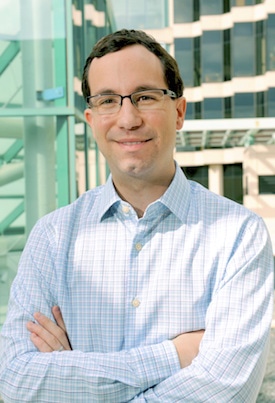Sep 16 2016
Researchers with the Harold C. Simmons Comprehensive Cancer Center successfully developed a synthetic polymer that can transport a drug into lung cancer cells without going inside of normal lung cells.
 Dr. Daniel Siegwart. (Credit: UT Southwestern Medical Center)
Dr. Daniel Siegwart. (Credit: UT Southwestern Medical Center)
Since conventional chemo drugs indiscriminately kill all rapidly dividing cells to halt the growth of cancer, these selective nanoparticles could decrease side effects by reducing drug accumulation in normal cells.
“The discovery that nanoparticles can be selective to certain cells based only on their physical and chemical properties has profound implications for nanoparticle-based therapies because cell type specificity of drug carriers could alter patient outcomes in the clinic,” said corresponding author Dr. Daniel Siegwart, Assistant Professor of Biochemistry at UT Southwestern Medical Center and with Simmons Cancer Center. “At the same time, a deeper understanding of nanoparticle interactions in the body opens the door to predict patient responses to existing liposome and nanoparticle therapies, and offers the potential to create future drug carriers customized according to individual genetic profiles.”
The findings appear in the Proceedings of the National Academy of Sciences.
The scientists tested hundreds of polymers to make the surprising discovery that cells could respond differently to the same drug carrier, even when those cancerous and normal cells came from the lungs of the same patient.
“These functional polyester nanoparticles provide an exciting alternative approach for selective drug delivery to tumor cells that may improve efficacy and reduce adverse side effects of cancer therapies,” said co-author Dr. John Minna, Professor and Director of the Nancy B. and Jake L. Hamon Center for Therapeutic Oncology Research, and Director of the W.A. “Tex” and Deborah Moncrief Jr. Center for Cancer Genetics at UT Southwestern.
The researchers developed new chemical reactions to create a diverse library of polymers that could deliver nucleic acid drugs while possessing enough structural diversity to discover cancer cell-specific nanoparticles. This is an important step to improving tailored cancer therapies to an individual’s specific genetic makeup.
“The ability to specifically target cancer cells using nanoparticles could alter how we administer drugs to patients,” said Dr. Minna, Professor of Pharmacology and Internal Medicine, and with Simmons Cancer Center, who holds the Sarah M. and Charles E. Seay Distinguished Chair in Cancer Research, and the Max L. Thomas Distinguished Chair in Molecular Pulmonary Oncology. “It is already possible to use genetic sequencing to customize drug regimens for each patient. We may also be able to customize the drug carrier to predictably improve patient responses.”
Nanoparticles are tiny spheres (1,000 times smaller than the width of a human hair) that can improve the solubility and delivery of drugs to cells. In this study, Cancer Center researchers delivered short interfering RNA (siRNA)-based drugs to disrupt the functioning and growth of tumor cells by eliminating the proteins the cells need to survive.
Amazingly, the cancer selective nanoparticles stayed inside of tumors in mice for more than one week, while nonselective control nanoparticles were cleared within a few hours. This translated to improved siRNA-mediated cancer cell death and significant suppression of tumor growth.
Support for this latest research came from the Cancer Prevention and Research Institute of Texas (CPRIT), Welch Foundation, American Cancer Society, UTSW’s Friends of
the Comprehensive Cancer Center, the UTSW Translational Pilot Program, and the NIH National Cancer Institute SPORE grant in Lung Cancer. The Special Program of Research Excellence (SPORE) in Lung Cancer program, now in its 18th year, is the largest thoracic oncology effort in the U.S.
Other UT Southwestern researchers involved in the study are Research Scientists Dr. Yunfeng Yan and Dr. Kenneth Huffman; Postdoctoral Researchers Dr. Hu Xiong and Dr. Petra Kos; Graduate Student Researchers Jason Miller and Sussana Elkassih with the UT Graduate School of Biomedical Sciences; Dr. James Kim, Assistant Professor of Internal Medicine and with the Hamon Center for Therapeutic Oncology Research; Dr. Li Liu, Assistant Professor of Radiology; Dr. Kejin Zhou, Assistant Instructor with Simmons Cancer Center; and researchers Dr. Ryan Carstens and John Norman.
The Harold C. Simmons Comprehensive Cancer Center is the only NCI-designated Comprehensive Cancer Center in North Texas and one of just 47 NCI-designated Comprehensive Cancer Centers in the nation. Simmons Cancer Center includes 13 major cancer care programs. In addition, the Center’s education and training programs support and develop the next generation of cancer researchers and clinicians. Simmons Cancer Center is among only 30 U.S. cancer research centers to be designated by the NCI as a National Clinical Trials Network Lead Academic Participating Site.